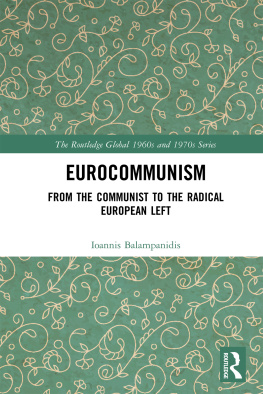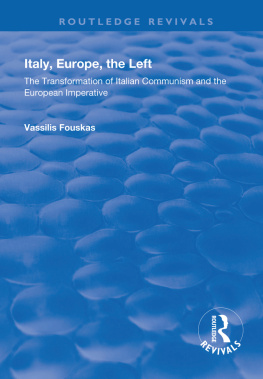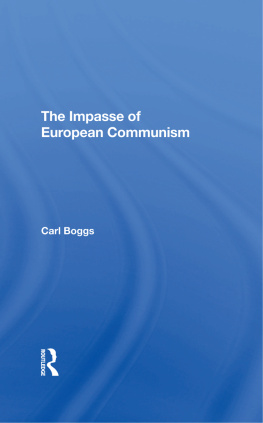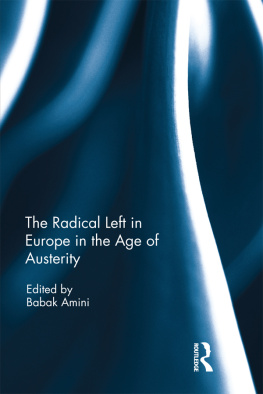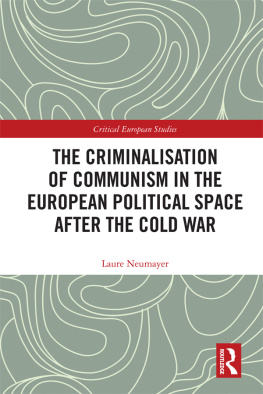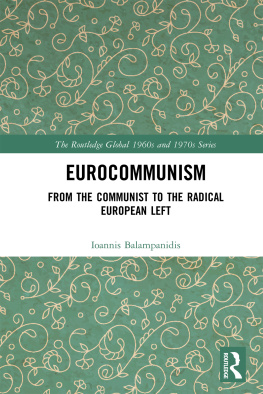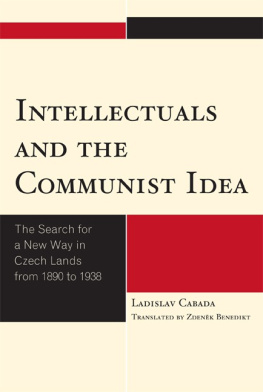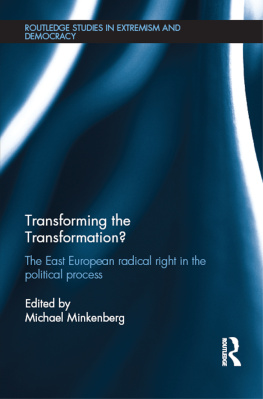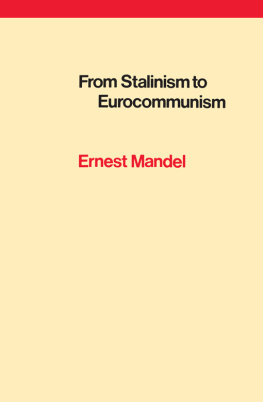Eurocommunism
Eurocommunism constitutes a moment of great transformation connecting the past and the present of the European Left, a political project by means of which left-wing politics in Europe effected a definitive transition to a thoroughly different paradigm. It rose in the wake of 1968 that pivotal year of social revolt and rethinking that opened a divide between radical, progressive, and socialist thinking in western and southern Europe and the Soviet model. Communist parties in Italy, France, Spain, and Greece changed tack, drew on the dynamics of social radicalism of the time and came to be associated with political moderation, liberal democracy, and negotiation rather than contentious politics, forging a movement that would exert influence until the early 1980s. Eurocommunism thus wove an original political synthesis delineated against both the revolutionary Left and the social democracy: party of struggle and party of governance.
Ioannis Balampanidis holds a PhD in Comparative Politics and is a researcher at the Centre for Political Research, Department of Political Science and History, Panteion University of Social and Political Sciences, Athens, Greece. He has studied Law at the Aristotle University of Thessaloniki and Political Theory at the University Paris 8, and has also accomplished part of his research at the Institut dEtudes Politiques (Sciences Po) of Paris. His research focuses on the European radical Left and social democracy, contemporary Greek politics, Europeanization, and political ideologies in late modernity. gbalabanidis@hotmail.com
The Routledge Global 1960s and 1970s
As the decades that defined the Cold War, the 1960s and 1970s helped shape the world we live in to a remarkable degree. Political phenomena including the almighty tussle between capitalism and communism, the ArabIsraeli conflict, apartheid in South Africa, and uprisings against authoritarianism and independence from colonial rule for a large swathe of the nations of the Global South helped define the period but the 1960s and 1970s were as much about cultural and social change, with lives the world over altered irretrievably by new standpoints and attitudes. Traditionally, analysis of the era has largely been concerned with superpower posturings and life in Europe and America, but this series, while providing full coverage to such impulses, takes a properly global view of the era.
Titles in the series include:
1Postcolonial Conflict and the Question of Genocide
The Nigeria-Biafra War, 19671970
Edited by A. Dirk Moses and Lasse Heerten
2African Political Activism in Postcolonial France
Gillian Glaes
3Eurocommunism
From the Communist to the Radical European Left
Ioannis Balampanidis
Eurocommunism
From the communist to the radical European Left
E
A A
Ioannis Balampanidis
Translated from the Greek by Dimitris Hall

First published in English 2019
by Routledge
2 Park Square, Milton Park, Abingdon, Oxon OX14 4RN
and by Routledge
711 Third Avenue, New York, NY 10017
Routledge is an imprint of the Taylor & Francis Group, an informa business
2015 by POLIS Publishers and Ioannis Balampanidis
The right of Ioannis Balampanidis to be identified as author of this work has been asserted by him in accordance with sections 77 and 78 of the Copyright, Designs and Patents Act 1988.
All rights reserved. No part of this book may be reprinted or reproduced or utilised in any form or by any electronic, mechanical, or other means, now known or hereafter invented, including photocopying and recording, or in any information storage or retrieval system, without permission in writing from the publishers.
Trademark notice : Product or corporate names may be trademarks or registered trademarks, and are used only for identification and explanation without intent to infringe.
Published in Greek by POLIS Publishers 2015
British Library Cataloguing-in-Publication Data
A catalogue record for this book is available from the British Library
Library of Congress Cataloging-in-Publication Data
Names: Balampanides, Giannes, 1980- author. | Hall, Dimitris, translator.
Title: Eurocommunism: from the communist to the radical European left/Ioannis Balampanidis; translated from Greek by Dimitris Hall.
Other titles: Eurokommounismos. English Description: Abingdon, Oxon; New York, NY: Routledge, 2019. | Translation of: Eurokommounismos: apo ten kommounistike ste rizospastike europaike Aristera. | Includes bibliographical references. | Identifiers: LCCN 2018030675 (print) | LCCN 2018043499 (ebook) | ISBN 9781351243698 (Ebook) | ISBN 9780815373322 | ISBN 9780815373322 (hardback:alk. paper)
Subjects: LCSH: CommunismEuropeHistory20th century. | Right and left (Political science)EuropeHistory20th century. | Right and left (Political science)EuropeHistory21st century.
Classification: LCC HX238.5 (ebook) | LCC HX238.5.B34913 2019 (print) | DDC 320.53/2094dc23
LC record available at https://lccn.loc.gov/2018030675
ISBN: 978-0-8153-7332-2 (hbk)
ISBN: 978-1-351-24369-8 (ebk)
Typeset in Galliard
by Deanta Global Publishing Services, Chennai, India
Contents
PART I
Eurocommunism in its time
PART II
The Eurocommunist transformation
PART III
Eurocommunism between national and supranational politics
PART IV
Conclusions
No doubt recognition of debts is the last passage of writing to be finished in cases such as this. But it is at the same time evidence that a research project is slightly less lonely than it may seem at first sight though, as we know, responsibility for mistakes and omissions are borne exclusively by the writer. So, may I be permitted, as the offspring of a host of different parents, to remember them here, with thanks.
To begin with, Nikos Theotokas, who has been a teacher since the first day that he welcomed me to the Panteion University. Thanks, of course, to Gerassimos Moschonas, who, at decisive moments of my research, brought me back to the methodological order of comparative politics, as well as to the unforgettable Stavros Konstantakopoulos for his constant encouragement, despite or because of our occasional disagreements.
I owe a similar debt of gratitude to Nicholas Sevastakis for his exemplary intellectual approach, Grigoris Ananiadis for shared exploration of more or less contemporary issues, Nikos Kotaridis for his laconic but timely interventions and Susannah Verney for some highly perspicacious comments. I also thank Yannis Voulgaris for generously allowing me to ransack the Eurocommunist shelves of his library and Andreas Pantazopoulos for the bibliographical references in French, and much more.
My colleagues and friends Christos Kanellopoulos and Sandy Liakaki were kind enough to read a significant part of the final text, Giorgos Ioannidis to enlighten me on issues of economic history, Loudovikos Kotsonopoulos and Vivian Spyropoulou to keep me supplied with findings from their own work.
The moral support (and every other kind of support) from my family has been invaluable over these years.
I am also grateful to Polis publishers for their support and generosity.
Finally, I should point out that this work can be understood as the product of two important communities to which I have had the good fortune to belong: to the community of political scientists and historians of the homonymous department of the Panteion University, and to the past but also present circle of the review O Politis , from where I gleaned an idea of what Eurocommunism was.

